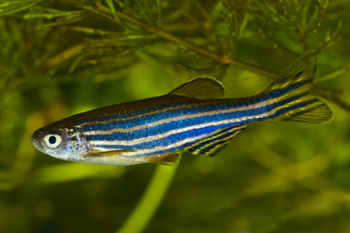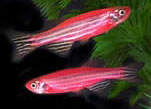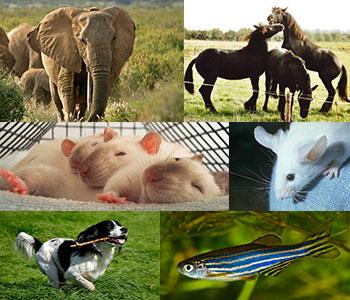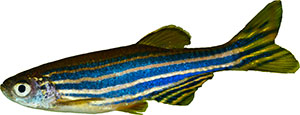A Morris water maze memory study in mice models of Alzheimer's disease
By G. Smit, MSc and A. Macbeth, PhD
What is the most popular drug in the world? It’s not alcohol, cannabis, or cocaine, but something most of us start with each day. Coffee; or, more specifically: caffeine. Like millions of other people, it helps me get started and prevents my morning headaches. Caffeine also has been shown to prevent age-related cognitive decline by reducing the risk of developing Alzheimer’s Disease (AD) and dementia. It is not surprising, then, that much research has already been done on the effect of caffeine in the development of AD.
Read More
Topics:
EthoVision XT,
Morris water maze,
mice,
Alzheimer's disease,
Video tracking,
learning and memory
We all know of animals that are able to regenerate: lizards that grow back their tails, flatworms that can grow into new worms when cut in half. Zebrafish have this special ability as well. You can’t cut them in half and expect two new zebrafish, but there are parts of their body that are able to regenerate, such as heart tissue. The heart cell can divide to replenish missing tissue; interestingly, this property is also shown in a newborn mouse heart, but is lost as the mouse matures (European Biopharmaceutical Review, April issue).
The key to spinal cord injury treatment?
Regenerative abilities may also be the key to spinal cord injury treatment; yet another good reason for scientists to study zebrafish in the lab. They may hold the key to the development of important therapies for spinal cord injury, as Liping Ma and colleagues show us in the April issue of PLOS ONE.
Read More
Topics:
EthoVision XT,
Video tracking,
zebrafish,
spinal cord injury,
regeneration
Zebrafish. This small little fish is a vertebrate, and a relatively complex one at that. Looking at all the major neurotransmitters and hormones that are investigated in neuroscience, they are as good of a model as many mammalian species. Indeed, recent studies have shown how they are ideal for testing in behavioral domains such as anxiety, sociality, sleep, reward, and cognition.
Read More
Topics:
EthoVision XT,
Video tracking,
social behavior research,
zebrafish,
anxiety research,
T-maze,
novel tank test,
bottom dwelling
Some disorders cannot simply be diagnosed with a blood test or tissue-culture. Autism Spectrum Disorder (ASD) is a good example; its diagnosis relies upon behavioral tests and questionnaires. Both are inherently subjective – you can imagine that research, diagnosis, and treatment of autism would benefit from a more efficient and objective way to measure behavior and quantify the severity of autism.
Video tracking children with ASD
Ira Cohen and his colleagues have made some significant steps in this direction in recent years. We wrote about his research last year in this blog post, telling you about how video tracking data correlated with the severity of autism in children. This research was presented at the International Meeting for Autism Research (IMFAR) in 2013, and recently published in Molecular Autism.
Read More
Topics:
EthoVision XT,
Video tracking,
autism research,
parent-child interaction
Why do wolves howl? From research, movies, and even television series, we learn that wolves cry out to each other to facilitate the reassembling of a pack when members have strayed. These calls are a functional way of long-distance communication, not only for wolves but also other species such as birds and mammals. So the functional importance of this behavior seems evident. But what actually makes a wolf cry? Is it because it misses its friends? Or is it simply something its body tells it to do?
Read More
Topics:
The Observer XT,
social behavior research,
mobile observation,
Pocket Observer,
social hierarchy,
wolves,
vocalizations
A study of environmental enrichment as possible brain tolerance inducing factor for strokes
Some research requires animals to be studied in groups. Of course, this is evident in social interaction studies, but it is also done simply to study each individual’s behavior while they are in a group. In both cases, it is very useful to have video tracking software that can automatically track the behavior of multiple animals simultaneously. Xie et al. recently published a study which shows just that.
Read More
Topics:
EthoVision XT,
Morris water maze,
Video tracking,
social behavior research,
rats,
stroke,
environmental enrichment
We already know some monkeys display above average intelligence. One way by which we can tell is their use of tools. Behavioral studies have shown that capuchin monkeys use boulders and logs as anvils upon which they can crush nuts. Furthermore, these monkeys have demonstrated that they are able to identify hammer stones best for cracking, and nuts that are easy to crack.
Photo courtesy of Barth Wright.
Read More
Topics:
The Observer XT,
video observation,
coding schemes,
ethogram,
monkey,
stationary research
Happy new year everybody! Yes, time goes by so fast. We already started a brand new year! We closed off 2012 with the most popular blog posts on human behavior research (listed in this post), so now let’s start 2013 with looking at the most popular blog posts on animal behavior research from last year.
Read More
Topics:
animal behavior research,
top 10,
2012
I have been reading a lot about zebrafish research lately and I thought it would be nice to share some of my favorite articles with you.
For an overview of what Noldus can do to help you out with your research, click below.

Read More
Topics:
EthoVision XT,
Video tracking,
animal behavior research,
zebrafish,
Danio rerio,
learning and memory,
anxiety research,
novel tank test,
cognition
















